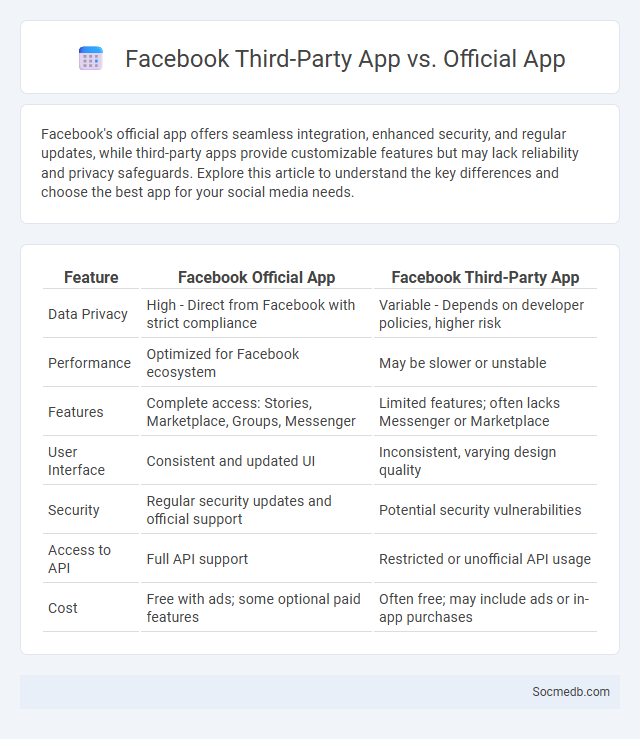
Photo illustration: Facebook Third-Party App vs Official App
Facebook's official app offers seamless integration, enhanced security, and regular updates, while third-party apps provide customizable features but may lack reliability and privacy safeguards. Explore this article to understand the key differences and choose the best app for your social media needs.
Table of Comparison
| Feature | Facebook Official App | Facebook Third-Party App |
|---|---|---|
| Data Privacy | High - Direct from Facebook with strict compliance | Variable - Depends on developer policies, higher risk |
| Performance | Optimized for Facebook ecosystem | May be slower or unstable |
| Features | Complete access: Stories, Marketplace, Groups, Messenger | Limited features; often lacks Messenger or Marketplace |
| User Interface | Consistent and updated UI | Inconsistent, varying design quality |
| Security | Regular security updates and official support | Potential security vulnerabilities |
| Access to API | Full API support | Restricted or unofficial API usage |
| Cost | Free with ads; some optional paid features | Often free; may include ads or in-app purchases |
Introduction to Facebook App Options
Facebook offers a variety of app options designed to enhance user experience, including Facebook Lite for low-data usage and Facebook Messenger for instant messaging. The platform integrates features such as Marketplace for buying and selling items, Groups for community engagement, and Events for organizing social activities. These options provide versatile tools that cater to communication, social networking, and online commerce needs.
What is the Official Facebook App?
The Official Facebook App is a social media platform developed by Meta Platforms, designed for mobile devices to enable users to connect, share content, and interact with friends and communities worldwide. It supports features such as news feed updates, photo and video sharing, event management, and messaging integration through Facebook Messenger. Optimized for seamless user experience, this app facilitates real-time notifications and access to personalized social media content.
Overview of Facebook Third-Party Apps
Facebook third-party apps extend the platform's functionality by integrating external services that enhance user experience and engagement. These apps range from games and productivity tools to marketing analytics, allowing businesses and individuals to leverage Facebook's extensive user data for personalized content and targeted advertising. Your interaction with these apps depends on the permissions granted, impacting data sharing and privacy on the social media network.
Comparing User Experiences: Official vs Third-Party
Official social media apps often provide seamless integration, enhanced security, and access to exclusive features tailored to the platform's ecosystem, offering a more consistent user experience. Third-party apps can deliver unique customization options, cross-platform functionality, and innovative tools that might not be available in official versions, catering to users seeking personalized interaction. Your choice between official and third-party apps depends on prioritizing either reliability and security or flexibility and advanced features.
Security and Privacy: Official vs Third-Party Facebook Apps
Official Facebook apps provide robust security measures and regular updates to protect your data, ensuring strict adherence to privacy policies. Third-party Facebook apps often lack comprehensive security protocols, increasing the risk of data breaches and unauthorized access to your personal information. Choosing the official app enhances your control over privacy settings and reduces vulnerabilities associated with external applications.
Feature Sets: What Each App Offers
Social media platforms each offer unique feature sets designed to cater to different user needs and content types. Instagram emphasizes visual storytelling through photos, Reels, and Stories, while Twitter focuses on real-time updates and concise messaging with Tweets and Threads. Understanding these distinct features helps you choose the best app to engage your audience and maximize your social media presence.
Performance and Resource Usage
Social media platforms optimize performance by deploying efficient content delivery networks and advanced caching mechanisms to reduce latency and ensure smooth user experiences. Your device's resource usage depends on the application's ability to manage background processes, memory consumption, and data synchronization effectively. Balancing high performance with minimal battery drain and data usage is essential for maintaining seamless social media interactions.
Customization and Flexibility
Social media platforms offer extensive customization and flexibility, allowing you to tailor your content, privacy settings, and notifications to match your unique preferences and professional goals. By utilizing advanced algorithms and user-friendly interfaces, these platforms enable precise audience targeting and content scheduling that maximize engagement and reach. Personalizing your social media experience enhances brand identity, improves user interaction, and drives meaningful connections across diverse online communities.
Pros and Cons of Each Facebook App Type
Facebook offers several app types including Pages, Groups, and Marketplace, each serving unique purposes. Pages provide public profiles ideal for businesses and brands to engage with a wide audience, but they require consistent content creation and management to maintain visibility. Groups foster community interaction and focused discussions, enhancing user engagement but sometimes face moderation challenges, while Marketplace facilitates local buying and selling, offering convenience at the risk of encountering unreliable transactions. Your choice depends on balancing these pros and cons to best meet your social media goals.
Choosing the Best Facebook App for Your Needs
Choosing the best Facebook app for your needs depends on understanding features like user interface, privacy settings, and compatibility with your device. Apps such as Facebook Lite, Facebook Messenger, and the standard Facebook app each offer unique benefits tailored to different usage patterns and internet speeds. Evaluating these options ensures you optimize your social media experience efficiently.
 socmedb.com
socmedb.com